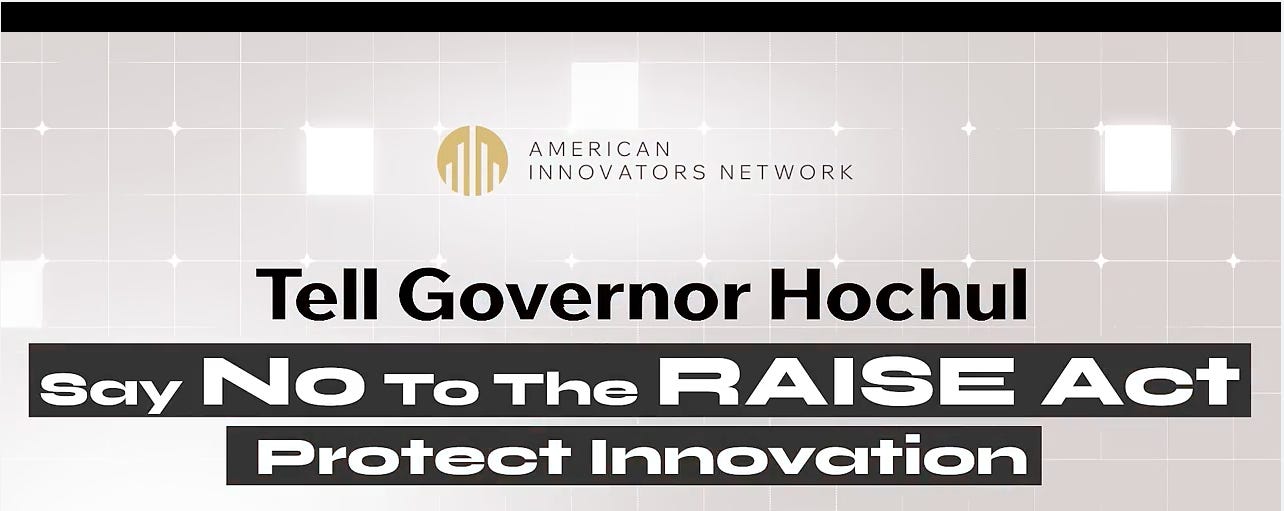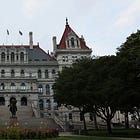An intense battle over the RAISE Act is entering its final stretch
New York State's AI bill is more ambitious than California’s SB 53 — and is facing opposition from Andreessen Horowitz and other tech groups
After SB 53 got the California governor’s signature last week, all eyes are now turning to New York’s RAISE Act — an arguably more ambitious bill, and one facing significant industry efforts to kill or dilute it. One industry campaign group alone has put at least $300,000 behind fighting AI regulation in the state this year, Transformer has found.
The “Responsible AI Safety and Education Act” — championed by Assembly Member Alex Bores and co-sponsored by State Senator Andrew Gounardes — is, much like SB 53, primarily a transparency bill. It would mandate safety testing and incident reporting for the largest AI model providers, requiring companies to disclose more information and face penalties if they don’t — up to $10m for a first violation and up to $30m for repeat violations.
Read Alex Bores’ op-ed for Transformer:
But it builds on SB 53 in meaningful ways. Whereas most of SB 53 applies to companies with more than $500m in annual revenue, RAISE covers those which have spent more than $100m in training compute costs — meaning it would apply to frontier AI developers that don’t generate revenue but are still performing large scale training runs, as Ilya Sutskever’s Safe Superintelligence Inc. is thought to be doing.
While both SB 53 and RAISE require companies to publish safety and security policies (SSPs), New York’s bill goes further in requiring those policies to “describe reasonable protections and procedures that, if successfully implemented would appropriately reduce the risk of critical harm,” as well as requiring many aspects of the SSP to be described “in detail.”1
RAISE’s text also details that if a company’s own tests find that a model poses an “unreasonable risk of critical harm,” it can’t release it — a way of forcing companies to actually follow their policies.
Those provisions, though, could find themselves on the chopping block. New York State has a unique legislative process which, in effect, allows Governor Kathy Hochul to ask for amendments to a bill even after it’s passed the legislature. And while insiders think an outright veto of the RAISE Act is unlikely, especially following the passage of SB 53, they do worry that the bill could be weakened under industry pressure.
That pressure is significant. Tech industry groups such as NetChoice and the Chamber of Progress have opposed the bill, claiming it will be ineffective and stifle innovation, and called on Hochul to veto it. In a letter to Hochul, Chamber of Progress wrote that the “legislation lacks a clear policy rationale, a concrete benefit to public welfare, and any demonstrated urgency to act at this scale today.”
Another industry lobbying group, the Andreessen Horowitz-backed American Innovators Network (AIN) has been particularly active in opposing the bill.
State disclosure records show AIN has signed contracts with lobbying firms worth more than $250,000 to lobby in Albany and across the state this year. One agreement with lobbying firm J Strategies details plans for “hyperlocal activation services,” including recruiting people to “champion responsible AI” and “grassroots mobilization” through social media, online petitions and community outreach.
AIN has also run ad campaigns aimed directly at voters, spending more than $100,000 on digital advertising specifically targeting the RAISE Act and other New York bills since the beginning of June. Ad records reviewed by Transformer show that it has spent almost $60,000 on Google ads targeting the RAISE Act, which have collectively been shown more than 6m times since late June.
It also spent between $57,000 and almost $70,000 on Facebook ads between the start of June and early August, which were shown around 2m times.
Some of the Facebook ads paint the RAISE Act as anti-innovation and bad for startups in the state, providing viewers with a form letter to send to the governor’s office. Other ads on X, which does not provide ad spending data, have appeared with messages warning “overregulation could wipe out thousands of New York Tech jobs.”
AIN did not respond to multiple requests for comment.
Gounardes says he hasn’t seen lobbying of this intensity since “social media companies tried to stop my social media bill two years ago,” when he managed to get measures designed to protect children online onto the statute books. “Whether it’s their willful ignorance at not being able to understand the need for regulation or it’s actually more nefarious,” Gounardes says of the latest efforts to fight regulation, “the consequences are the same.”
Bores recalls giving the top AI companies affected by the bill an early draft a year ago, then a second draft in December before introduction, with some groups offering “very substantive engagement.” Others, he says, chose not to provide feedback during that process — and have become some of the most vocal groups spending money to kill the bill.
“In particular, I’m talking about venture capital groups in California who decided to not engage in real red lines back and forth.”
The approach, he says, resembles tactics from Big Tobacco and Big Oil: “When you have groups that have lost the substantive debate, they just want to carpet bomb the legislative process with money in hopes that they get their way.” That money, Bores says, has “drowned out” the debate.
Bores has himself worked in industry, spending several years at Palantir, followed by stints at startups — one of which used AI models to help banks fight money laundering and terrorism funding. He also holds a master’s in machine learning.
The RAISE Act, he says, was motivated by companies’ failure to live up to the spirit of the commitments they made to the White House back in 2023. Despite their promises, he said, the companies weren’t doing the right safety checks and were releasing AI models without public safety cards.
“The role of government is — when you have a potential market failure — to set a basic floor of safety that everyone knows they’ll be held [to],” even when facing quarterly profit targets or the need to fundraise, Bores says. Laws like the RAISE Act are needed to ensure “there’s a countervailing force to the extremely strong incentive to take a shortcut on their safety plan.”
Many agree. The RAISE Act has won broad support from labor groups, startups, investors and prominent AI experts including Geoffrey Hinton, with polling showing 84% of New Yorkers back the legislation.
Whether that will translate into Governor Kathy Hochul supporting the bill in its current form remains to be seen. Sources expect negotiations with the governor to start in earnest in the coming weeks, and for the governor to sign the bill by early January (if not significantly before then).
Hochul’s decision could have wide ramifications, potentially adding to calls for federal AI regulation to prevent a “patchwork” of differing AI regulation.
Almost everyone agrees that a federal standard would indeed be better. But as Gounardes tells Transformer, “unfortunately, Congress can’t seem to legislate its way out of a paper bag these days.”
Bores concurs. “While I strongly believe that the best version of this is one that happens at the federal level,” Bores says, “the optimal version is one that exists.” For now, and for New York, that’s the RAISE Act.
As Ranjit Singh, program director of AI on the Ground at Data & Society, a think tank, tells Transformer, much will depend on how the state attorney general chooses to interpret “reasonable” — a common issue for many laws.
Clarification 9 Oct: This article was amended to clarify that it is most of SB 53 that applies to companies with revenue over $500m. Other parts also apply to companies that don’t meet this threshold.






Great post. Quick clarification: "Whereas SB 53 applies to companies with more than $500m in annual revenue..." SB 53 applies to companies that train models using 10 ^ 26 FLOPs, but has additional requirements for those with more than $500m in revenue.